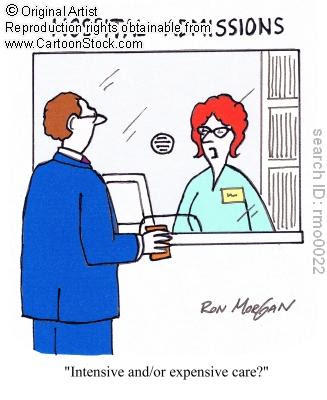
There has been a lot of discussion about the health insurance industry and their impact on our health care. When you realize that their overhead ranges from 20 to 50% of every premium dollar while Medicare's overhead is less than 5%, you see that there is a big saving available just by putting the private health insurance business out of business.
But I want to bring up another aspect of health care costs that I don't hear talked about much and that is the billing practices of health care providers. Health care providers, doctors and hospitals particularly, charge exorbitant fees only to have the insurance companies knock down those fees to something more reasonable -- that is IF you happen to have insurance AND the insurance COVERS the billed procedures. If not, you have to pay the exorbitant fees.
This practice was brought back into focus for me with the billing of my cataract surgery to my insurance company. I was billed $5000 for one eye. The insurance company knocked $5000 down to about $800. I have to pay the $800 because I have not fulfilled my deductible yet. If I did not have insurance, I would owe $5000. I assume that the agreement that my doctor has with my insurance company is similar to his agreement with other insurance companies. If he is willing to take $800 for the procedure from the insurance company, why does he bill $5000?
Another example. I get a blood test every month. I go to a lab close to my house. They draw blood. Send it to their lab and analyze it. They bill my insurance company for drawing the blood and separately for analyzing it. Total bill for these two things -- $51.75. Allowed by the insurance (and paid by me) -- $8.86.
People who don't have insurance get the privilege of paying the full amount. These are often the very people who can afford it the least. They may be out of a job or work for an employer who does not provide insurance. One way of the other, they cannot afford insurance, yet they have to pay the highest prices.
Health care providers should not be allowed to charge fees that are many times higher than they accept from insurance companies.






This is indeed mind-boggling, Jerry. My insurance, as horribly expensive as it is in both its premiums and deductibles, does the same thing -- renegotiates the prices for doctors and medical services. This is the reason, btw, why many doctors refuse to accept it.
ReplyDeleteBut when we look at what we are originally charged and then compare it with the new, negotiated price, often our jaws drop -- because the difference is so huge.
This is again the capitalist cartels' math: why charge less if you can charge so much more and nobody would make a peep (because there is no viable competition).
It is a common practice at hospitals to stick the highest bills to the uninsured as nobody will question them and the payment is expected in full -- or else.
Another common practice, one I experienced both as a patient and a hospital employee (at one time) is to pad a patient's bill with services and gadgets they have never received. I have stories to tell about this one. My latest is charging us for oxygen during one of my ER visit (pre-tumor surgery) -- oxygen I never needed or got.
A lot of times hospitals are open to discussion in these matters and are willing to drop the extra (i.e., made-up) charges, but one has to be vigilant and/or remember what exactly one obtained during the hospital stay -- and how many sick people are able to keep track of that?
It's a big mess. Time to change it.
Also, I think itemized bills are becoming a thing of the past. The insurance companies might get one, but I don't remember the last time I got one. Usually it is just a statement from the insurance company.
ReplyDelete